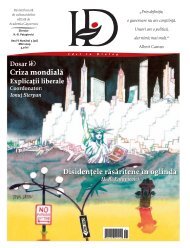Sensul vietii - Ecleziastul, Kant, Nietzsche, Tzara - CADI
Sensul vietii - Ecleziastul, Kant, Nietzsche, Tzara - CADI
Sensul vietii - Ecleziastul, Kant, Nietzsche, Tzara - CADI
You also want an ePaper? Increase the reach of your titles
YUMPU automatically turns print PDFs into web optimized ePapers that Google loves.
the highest concepts, that which has being, the unconditional, the good, the true, the perfect-all<br />
these cannot have become and must therefore be causes. All these, moreover, cannot be<br />
unlike each other or in contradiction to each other. Thus they arrive at their stupendous<br />
concept, "God." That which is last, thinnest, and emptiest is put first, as the cause, as ens<br />
realissimum. Why did mankind have to take seriously the brain afflictions of sick web-spinners?<br />
They have paid dearly for it!<br />
5<br />
It is no different in this case than with the movement of the sun: there our eye is the constant<br />
advocate of error, here it is our language. In its origin language belongs in the age of the most<br />
rudimentary form of psychology. We enter a realm of crude fetishism when we summon before<br />
consciousness the basic presuppositions of the metaphysics of language, in plain talk, the<br />
presuppositions of reason. Everywhere it sees a doer and doing; it believes in will as the cause;<br />
it believes in the ego, in the ego as being, in the ego as substance, and it projects this faith in<br />
the ego-substance upon all things--only thereby does it first create the concept of "thing."<br />
Everywhere "being" is projected by thought, pushed underneath, as the cause; the concept of<br />
being follows, and is a derivative of, the concept of ego. In the beginning there is that great<br />
calamity of an error that the will is something which is effective, that will is a capacity. Today<br />
we know that it is only a word.<br />
6<br />
It will be appreciated if I condense so essential and so new an insight into four theses. In that<br />
way I facilitate comprehension; in that way I provoke contradiction. First proposition. The<br />
reasons for which this world has been characterized as "apparent" are the very reasons which<br />
indicate its reality; another kind of reality is absolutely indemonstrable. Second proposition.<br />
The criteria which have been be stowed on the "real being" of things are the criteria of notbeing,<br />
of nothingness; the "real world" has been constructed out of contradiction to the actual<br />
world: indeed an apparent world, insofar as it is merely a moral-optical illusion.<br />
Third proposition. To invent fables about a world "other" than this one has no meaning at all,<br />
unless an instinct of slander, detraction, and suspicion against life has gained the upper hand in<br />
us: in that case, we<br />
avenge ourselves against life with a phantasmagoria of "an other," a "better" life. Fourth<br />
proposition. Any distinction between a "real" and an "apparent" world whether in the Christian<br />
manner or in the manner of <strong>Kant</strong> (in the end, an under-handed Christian)-is only a suggestion of<br />
decadence, a symptom of the decline of life. That the artist esteems appearance higher than<br />
reality is no objection to this proposition. For appearance" in this case means reality once more,<br />
only by way of selection, reinforcement, and correction. The tragic artist is not a pessimist: he is<br />
precisely the one who says Yes to everything questionable, even to the terrible-he is Dionysian.<br />
HOW THE "TRUE WORLD" FINALLY BECAME A MITH. THE HISTORY OF AN ERROR<br />
1. The true world--attainable for the sage, the pious, the virtuous man; he lives in it, he is it.<br />
(The oldest form of the idea, relatively sensible, simple, and persuasive. A circumlocution for<br />
the sentence, "I, Plato, am the truth.")<br />
2. The true world--unattainable for now, but promised for the sage, the pious, the virtuous man<br />
("for the sinner who repents"). (Progress of the idea: it becomes more subtle, insidious,<br />
incomprehensible--it becomes female, it becomes Christian. )



